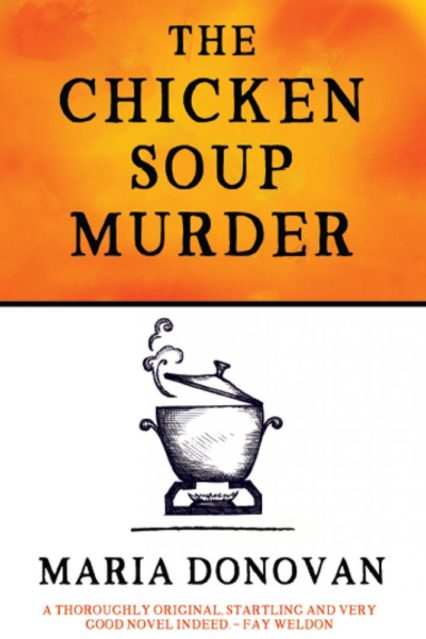Frances Spurrier reviews The Chicken Soup Murder by Maria Donovan, a book with heart which posits an interesting idea but doesn’t quite live up to its title.
Who could resist the chance to review a book with a title like this? How could that delicious homely concoction – that bringer of liquid comfort with added noodles, that recognised childhood substitute for penicillin – be lethal? This clever title sets up expectations that the book is a murder story; but (Spoiler alert) it is not. Although there is a sudden and unexplained death, this is not the same thing. The ‘murder’ in the title refers to the protagonist’s belief that one has taken place. The fact that he is not believed takes up a certain amount of the story.
The story of The Chicken Soup Murder is told through the eyes of an about-to-be-teenage narrator Michael, who lives with his grandmother. His parents are missing in some permanent, unauthorized absence and what has happened to them turns out to be a significant part of the story.
The “murder” of the title takes place in the next door neighbour’s house in the small seaside town where they live. The police investigate, but all is not what it seems and Michael’s small town life is due for some disturbances before we’re through.
The developing plot of The Chicken Soup Murder surprises would be upsetting for most 12 year olds. Where the reader might expect some raw feeling, some emotional truth in reaction to such a scenario, Donovan, disappointingly, prefers one-liners and light humour. At the heart of this novel’s story is a great big lie, which has less to do with death but everything to do with people failing to take responsibility for their actions or consider or misconstrue that responsibility as it will affect the next generation. The book also considers how we deal with loss and grief, or at least, how the protagonist deals with loss and grief.
Donovan gives the narrator some good lines, (I particularly liked touches such as: ‘Some day I will find out that life is only pretending to be shit…’), but on the whole the style is wooden. The combined use of the present tense with a significant amount of dialogue delivers a relentless barrage of he says, she says. This is an example of the dialogue that takes place around unwrapping a chess set at Christmas:
‘I’ve already got one of these’, I say.
‘Michael!’ says Nan
‘It’s OK,’ says my Dad. ‘We didn’t know. I mean we thought you didn’t have one’.
‘I only got it today,’ I say…
The idea of representing a young person’s thoughts and language as somehow different to ‘an adult’s’ on the page is a trap better avoided. Again this is perhaps a quibble but on several occasions I found myself pulled up short by the choice of character names which includes Janey, Terry, Melly, Bully. I wondered if it was necessary to choose so many diminutives.
The Chicken Soup Murder posits an interesting idea, but in the case of sudden and unexplained death people are entitled to be suspicious. That’s the whole point of the sudden and unexplained bit. Thus when Michael’s suspicions are treated as invalid, it doesn’t feel real in one way and yet in another isn’t it true that we often ignore and patronize our children even as we tell ourselves that we are doing the right thing and know best?
Ultimately, the book doesn’t meet the expectations that Donovan sets up with its title since there is no murder and the issues that are brought up by the possibility of one have little to do with the other element of the saga which relates to the absent parents. But what it does achieve, it achieves with a great deal of heart.
The Chicken Soup Murder by Maria Donovan is available now from Seren











